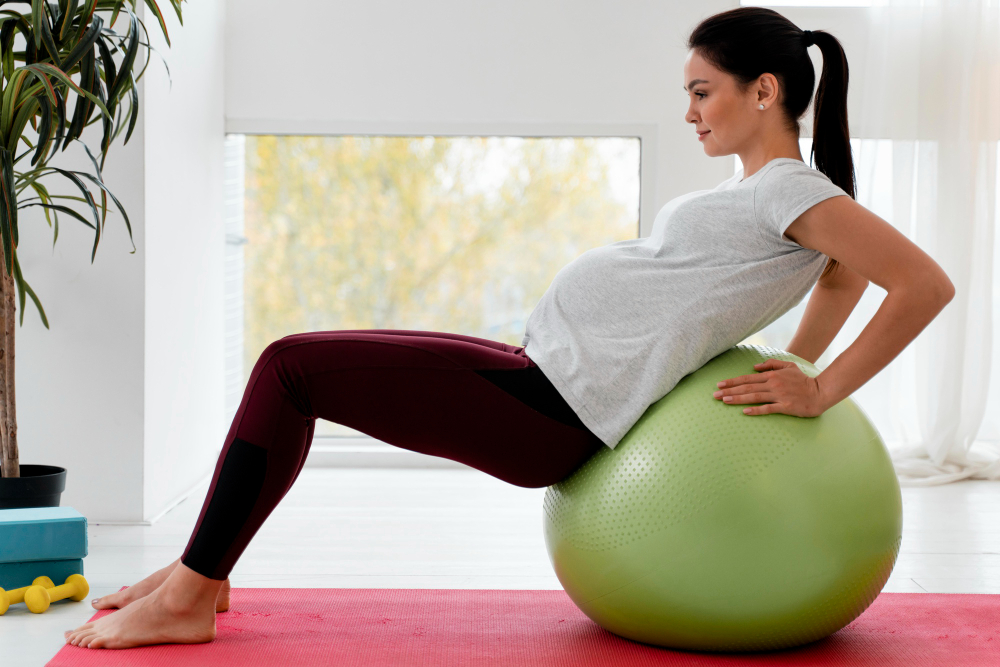Pregnancy is undoubtedly an exciting and transformative time in a woman's life. However, it is also a period that requires utmost care and caution, especially when it comes to maintaining a healthy lifestyle. One aspect that should not be overlooked is exercise during pregnancy. Engaging in safe physical activities not only offers numerous benefits for both the expectant mother and the growing baby, but it also helps in managing weight gain, relieving discomfort, and promoting healthy childbirth. In this blog post, we will explore the benefits of exercise during pregnancy, the different types of safe sports for expectant mothers, precautions to be taken while exercising, the importance of consulting a healthcare professional, and how to continue exercising safely as the pregnancy progresses. So, let's dive in and discover the wonders of staying active during this incredible journey of pregnancy.

During pregnancy, many women may be hesitant to engage in physical activity for fear of harming themselves or their unborn child. However, maintaining a regular exercise routine can actually provide numerous benefits for both the mother and baby.
Firstly, exercise during pregnancy can help to improve the mother's overall well-being. Regular physical activity can boost energy levels, reduce feelings of fatigue, and improve sleep quality. This is especially important during pregnancy, as many women often experience increased tiredness and difficulty sleeping.
Additionally, exercise can help to alleviate common pregnancy discomforts. For example, regular physical activity can reduce backaches, swollen ankles, and constipation. It can also improve digestion and circulation, which can be crucial in preventing gestational diabetes and high blood pressure.
When it comes to staying active during pregnancy, many women wonder what types of sports and activities are safe for them and their growing baby. The good news is that there are plenty of options for pregnant women to stay fit and healthy while still enjoying physical activity. It's important to remember that every woman's pregnancy is different, so consulting with a healthcare professional before starting or continuing any exercise regimen is crucial.
One of the safest sports for pregnant women is walking. Walking is a low-impact exercise that can be done at any stage of pregnancy. It helps to improve cardiovascular health, maintain a healthy weight, and can even help to prepare the body for labor. Walking can easily be incorporated into a daily routine and doesn't require any special equipment.
Another safe sport for pregnant women is swimming. Swimming is a great way to stay active without putting too much stress on the joints and ligaments. The weightlessness of the water can make exercising more comfortable for pregnant women, especially as they reach their third trimester. Swimming helps to strengthen muscles, improve flexibility, and can alleviate many of the common discomforts of pregnancy. Whether it's swimming laps, taking a water aerobics class, or simply enjoying a leisurely swim, pregnant women can benefit greatly from this low-impact sport.
| Benefits of Swimming for Pregnant Women: | ||
|---|---|---|
|
|
|
Yoga is another safe and beneficial sport for pregnant women. Prenatal yoga classes are specifically designed to cater to the unique needs and challenges of pregnancy. Yoga helps to improve strength, flexibility, and balance, while also promoting relaxation and mindfulness. It can help pregnant women to maintain good posture, reduce lower back pain, and alleviate stress and anxiety. Additionally, certain yoga poses can be helpful in preparing the body for childbirth and facilitating an easier labor.
While these are just a few examples of safe sports for pregnant women, it is important to note that every woman's individual circumstances may vary. It is crucial to consult with a healthcare professional before starting or continuing any exercise regimen during pregnancy. They will be able to provide personalized guidance and recommendations based on your specific needs and medical history. Staying active during pregnancy can have numerous benefits for both mom and baby, so finding safe and enjoyable sports to engage in is definitely worth considering.

Exercising during pregnancy can be beneficial for both the mother and the baby. It helps to improve cardiovascular health, maintain a healthy weight, boost mood, and even alleviate common pregnancy discomforts. However, it is crucial to take certain precautions to ensure the safety and well-being of both the mother and the baby. Here are some important precautions to keep in mind when exercising while pregnant:
1. Consult with a healthcare professional: Before starting any exercise routine during pregnancy, it is recommended to consult with your healthcare professional. They can provide personalized advice and guidance based on your specific health condition and pregnancy stage.
2. Listen to your body: Pay close attention to how your body feels during exercise. If you experience any pain, dizziness, shortness of breath, or vaginal bleeding, it is important to stop exercising and seek medical attention immediately.
3. Avoid high-impact activities: As the body undergoes various changes during pregnancy, it is advisable to avoid high-impact activities that may put excessive stress on the joints and ligaments. Activities such as contact sports, skiing, horse riding, and intense forms of aerobics should be avoided.
| Safe Exercises During Pregnancy | Avoid These Activities |
|---|---|
|
|
4. Stay hydrated: It is important to stay well-hydrated before, during, and after exercise. Drink plenty of water to prevent dehydration, which may lead to dizziness, fatigue, and overheating.
5. Wear the right attire: Choose comfortable, breathable, and supportive clothing and footwear suitable for exercise during pregnancy. This will ensure proper body temperature regulation and minimize the risk of injury.
6. Modify your exercises: As your pregnancy progresses, certain exercises may need to be modified or avoided altogether. Avoid exercises that involve lying flat on your back after the first trimester, as it can reduce blood flow to the uterus. Instead, opt for exercises in a reclined or elevated position.
Remember, every pregnancy is unique, and what works for one woman may not work for another. It is essential to listen to your body, seek professional advice, and make modifications as necessary. By taking these precautions, you can safely enjoy the benefits of exercise during pregnancy and contribute to a healthy and happy pregnancy journey.
When it comes to pregnancy, the health and well-being of both the mother and the baby are of utmost importance. It is crucial for pregnant women to consult a healthcare professional throughout their pregnancy journey. Consulting a healthcare professional provides numerous benefits and ensures that any concerns or queries are addressed in a timely and accurate manner.
One of the primary benefits of consulting a healthcare professional during pregnancy is the personalized guidance and support they provide. Each pregnancy is unique, and a healthcare professional can assess individual needs and tailor advice accordingly. They can provide information on various aspects of pregnancy, including nutrition, exercise, prenatal vitamins, and potential risks or complications that may arise. This personalized guidance helps ensure that pregnant women receive the best care possible for a healthy pregnancy.
Another important reason to consult a healthcare professional is to monitor the progress of the pregnancy. Regular check-ups with a healthcare professional are essential to assess the baby's growth and development, as well as the mother's overall health. These check-ups may involve physical examinations, measuring the mother's weight and blood pressure, and the use of diagnostic tests, such as ultrasounds, to monitor the baby's health. By closely monitoring the pregnancy, healthcare professionals can identify any potential issues and provide appropriate interventions or treatments.

As your pregnancy progresses, it is important to continue exercising in a safe and controlled manner. Exercising during pregnancy can provide numerous benefits, including improved mood, increased energy, and decreased discomfort. However, it is vital to be aware of certain precautions and guidelines to ensure both your safety and the well-being of your baby.
Firstly, it is crucial to consult with a healthcare professional before starting or continuing any exercise routine during pregnancy. Your doctor or midwife will be able to provide personalized advice and recommendations based on your specific circumstances. They can help you assess any potential risks or complications and guide you on the most suitable exercises for maintaining a healthy pregnancy.
Once you have received clearance from your healthcare provider, it is important to choose the right types of exercises for each stage of your pregnancy. Low-impact exercises such as walking, swimming, and prenatal yoga are generally considered safe options. These activities help to maintain cardiovascular fitness, strengthen muscles, and improve flexibility without placing excessive strain on your joints.
As your pregnancy progresses, it is important to listen to your body and make appropriate modifications to your exercise routine. Pay attention to any signs of discomfort or fatigue and adjust the intensity and duration of your workouts accordingly. Remember, the goal is to maintain a moderate level of physical activity without overexerting yourself.
In addition to choosing the right exercises, it is crucial to prioritize safety during your workouts. Avoid exercises that involve lying flat on your back, as this position can reduce blood flow to the uterus. Instead, opt for side-lying positions or exercises that keep you in an upright position. It is also important to stay hydrated, wear comfortable and supportive clothing, and use proper footwear to prevent any accidents or injuries.
| Benefits of Exercising During Pregnancy: | Types of Safe Sports for Pregnant Women: |
|---|---|
| 1. Improved mood: Regular exercise releases endorphins, the feel-good hormones, which can help alleviate pregnancy-related stress and anxiety. | 1. Walking: A simple and accessible activity, walking is safe for most pregnant women and can be easily incorporated into daily routines. |
| 2. Increased energy: Staying physically active can boost energy levels and combat fatigue during pregnancy. | 2. Swimming: Swimming is a low-impact sport that provides a full-body workout while minimizing the risk of strain or injuries. |
| 3. Decreased discomfort: Regular exercise helps to alleviate common pregnancy discomforts, such as backache and swelling. | 3. Prenatal Yoga: Prenatal yoga combines gentle stretching, breathing techniques, and relaxation, promoting both physical and mental well-being. |